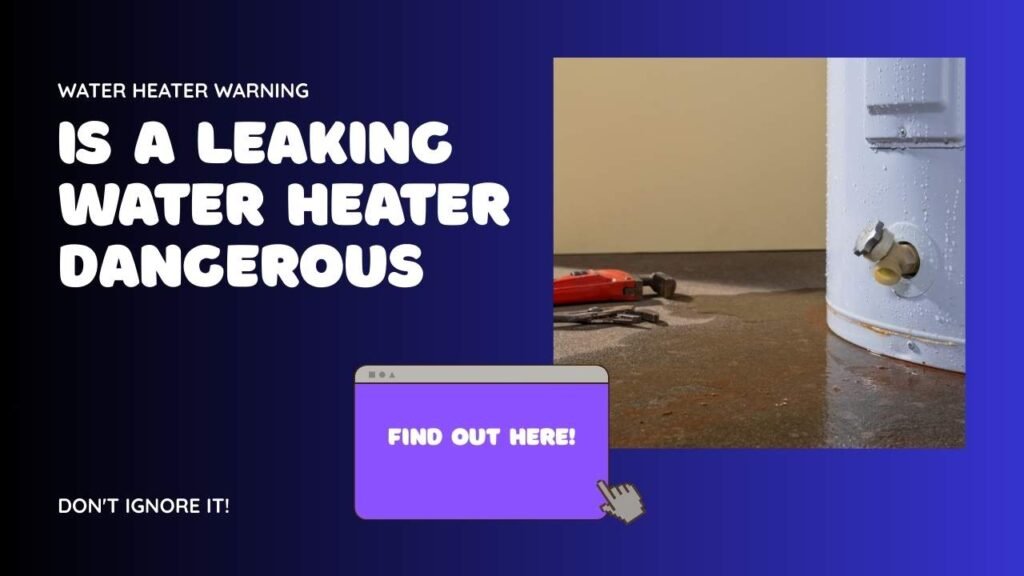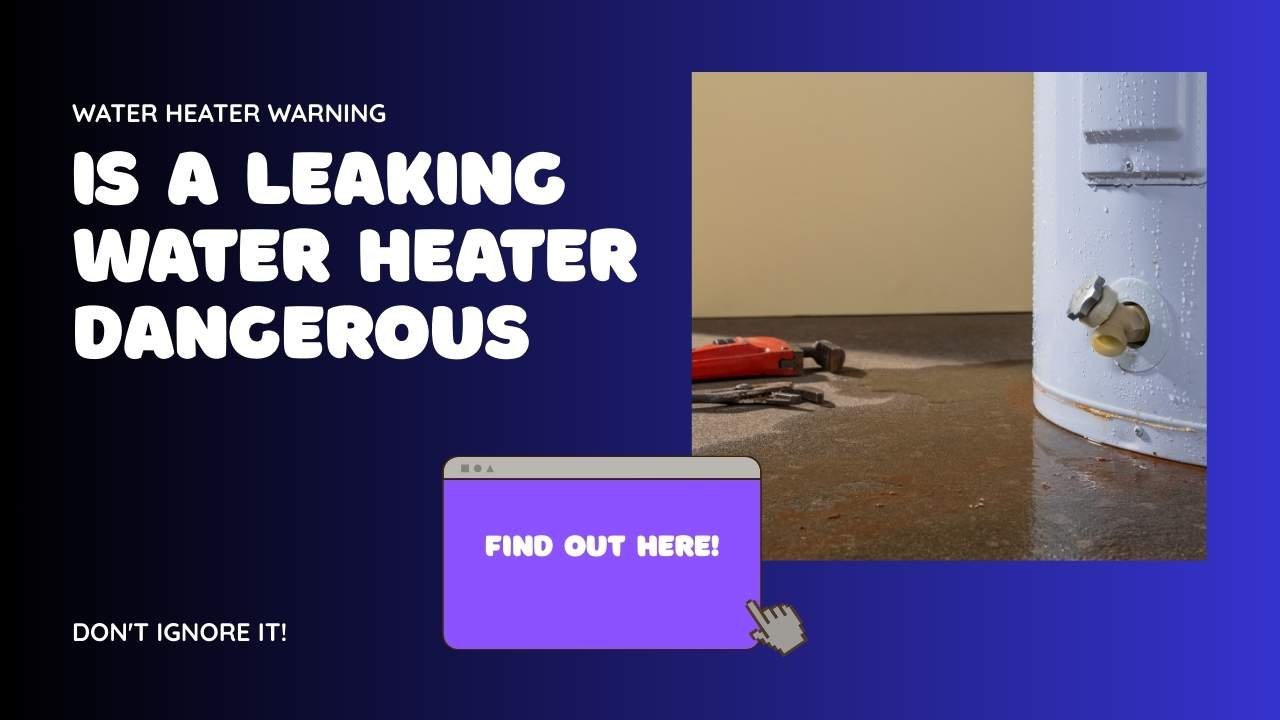Imagine waking up to a small puddle under your water heater. You think, “It’s just a little water; it’s probably nothing serious.” Days turn into weeks, and what started as a minor inconvenience now floods your laundry room and sparks an emergency call to a plumber. Unfortunately, this scenario is more common than you think, and it highlights an important question many homeowners ask themselves: Is a leaking water heater dangerous?
The short answer? Yes, and it can pose more risks than you might realize. From water damage and electrical hazards to gas leaks and mold, a leaking water heater poses safety and financial headaches if left unaddressed. This post will explore the risks, warning signs, and what you should do the moment you discover your water heater leaking from the bottom, top, or anywhere in between.
1. Common Causes of Water Heater Leaks
Understanding the origin of a leak can help you gauge how severe the issue is. Here are the most common culprits behind water heater leaks:
Corrosion & Age
Water heaters have a lifespan of 8–12 years, and as they age, internal components like the tank and pipes begin to corrode. Corrosion weakens the tank walls, creating rust spots or small cracks that eventually start to leak.
Loose or Unsealed Fittings
Over time, the fittings and connections between pipes and your heater may loosen due to constant wear and tear. If they’re not properly sealed or tightened, water can seep through these weak areas.
Faulty Pressure Relief Valve
A temperature and pressure relief (T&P) valve is designed to release excess pressure safely. However, if this valve is faulty or improperly installed, it might leak as a safety measure when it shouldn’t.
Cracked Tank or Connections
High water pressure, sediment buildup, and poor maintenance may cause the tank itself or nearby connections to crack. Unfortunately, a cracked tank is generally irreparable, leaving replacement as the only option.

2. The Hidden Dangers of a Leaking Water Heater
With something as essential as hot water in our daily lives, we often underestimate the risks a leaking water heater can pose. Here’s why you shouldn’t ignore the problem:
Structural & Water Damage
Even small, persistent leaks can wreak havoc on your home’s structure. Water can seep into your floors, walls, or ceilings, weakening them over time. Hardwood flooring may warp, drywall may crumble, and you could end up with an expensive mess.
Electrical Shock & Fire Risk
Is your water heater located near electrical outlets or wiring? If water from the leak comes into contact with electricity, it could create a fire hazard or even lead to electrical shock. For electric water heaters, internal wiring may also short-circuit.
Carbon Monoxide & Gas Leaks
Is a leaking gas water heater dangerous? Absolutely. If it’s a gas-fired unit, the risk of carbon monoxide poisoning increases. Gas leaks can build up in confined spaces, creating a potentially explosive hazard.
Mold Growth & Health Implications
A water heater leaking from the bottom or top can create the moist, humid conditions that mold thrives in. Mold spores can impact indoor air quality, leading to respiratory problems, allergies, and other health issues for your family.
3. How to Spot Early Warning Signs of a Leak
Catching the problem early can make all the difference between a quick fix and a costly replacement. Pay attention to these warning signs:
- Drips or Puddles Around the Base: Any unexplained water near your heater is a clear indication of a leak.
- Rusty or Discolored Water: Rust-colored water flowing from your faucets could suggest internal corrosion in the tank.
- Unusual Noises: Popping, snapping, or hissing sounds indicate sediment buildup in the tank or pressure issues.
- Drop in Water Pressure or Temperature Fluctuations: Weak water flow or inconsistent hot water could hint at problems with your water heater’s components.
4. Immediate Steps to Take When You Discover a Leak
A leaking water heater is a problem you can’t afford to ignore, even temporarily. Here’s what you should do as soon as you notice the issue:
- Turn Off the Power: For electric units, switch off the breaker. For gas units, set the gas valve to “off” to avoid safety risks.
- Shut Off the Water Supply: Use the shut-off valve near the heater to stop water flow to the unit.
- Contain and Mop Up Water: Prevent further damage by mopping up any pooled water and placing a bucket or pan under the leak.
- Call a Certified Plumber: A professional can diagnose the cause and recommend whether a repair or replacement is necessary.
5. Preventive Measures & Routine Maintenance
Prevention is your best defense against leaking water heaters. Here are some maintenance tips to extend your water heater’s life:
- Annual Professional Inspections: Have a plumber inspect and service your water heater once a year to catch issues early.
- Flush the Tank: Sediment buildup can cause overheating and cracks in the tank. Flushing the tank annually removes this buildup.
- Check the Anode Rod: This sacrificial rod prevents rust inside your tank. Inspect and replace it every 2–3 years.
- Install a Drip Pan & Leak Sensor: These affordable tools help catch leaks early and protect your floors from water damage.
6. When to Repair vs. Replace Your Water Heater
Facing a leaking water heater often leaves homeowners wondering whether to fix it or get a new one. Here are some key considerations:
- Age Threshold: If your water heater is over 8–12 years old, a replacement is usually more cost-effective.
- Cost-Benefit Analysis: If repair costs are over 50% of the price of a new unit, it may be worth upgrading.
- Energy Efficiency: New water heater models are far more energy-efficient, which can reduce utility bills in the long run.
Don’t Ignore the Risks of a Leaking Water Heater
A leaking water heater can be more than just a minor annoyance. From structural damage to dangerous gas and electrical issues, the risks are real and substantial. The good news is that with routine maintenance and quick action when a problem arises, you can save yourself from costly repairs and serious safety concerns.
Don’t wait until a small puddle turns into a flooded basement. Schedule your water heater inspection today and ensure your home stays safe and dry!
How do I know if my water heater is leaking?
Look for puddles, water stains, or rust around the base. Listen for hissing, popping, or dripping sounds. If hot water runs out faster than usual or your water bill spikes, it could indicate a leak.
Can I fix a leaking water heater myself?
Yes, for minor issues like a loose drain valve or pipe fittings, which can be tightened or sealed with plumber’s tape. Replace a faulty T&P valve if needed. For tank leaks or gas heaters, call a professional to avoid risks. Always turn off power/gas and water before attempting repairs.

Anamika is a passionate writer for Eco365Store.com, specializing in topics that inspire a cleaner, greener world. With expertise in home cleaning, recycling, and eco-friendly solutions, she crafts engaging and informative articles that help readers adopt sustainable practices in their daily lives.

